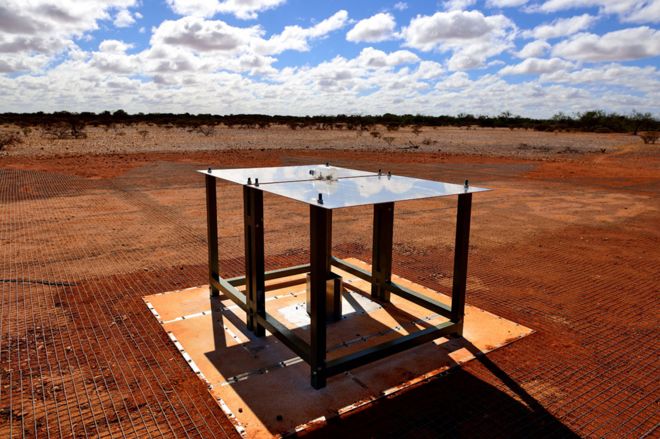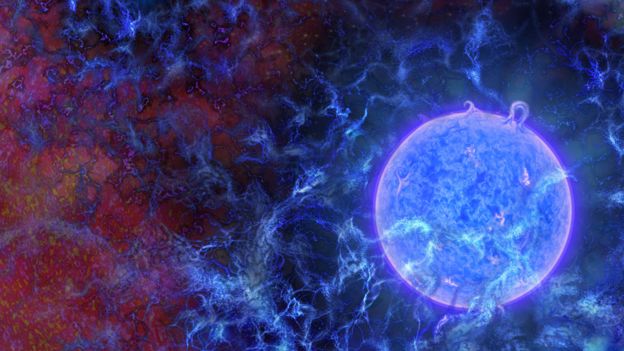
The radio spectrometer at Murchison is a little smaller than a table-tennis table
Scientists say they have observed a signature in the sky from the very first stars ever to shine in the Universe.
They did it with the aid of a small radio telescope in the Australian outback that was tuned to detect the earliest ever evidence for hydrogen. This hydrogen was in a state that could only be explained if it had been touched by the intense light of stars. The team puts the time of this interaction at a mere 180 million years after the Big Bang. Given that the cosmos is roughly 13.8 billion years old, it means the first stars lit up a full nine billion years before even our own Sun flickered into life.
Dr Judd Bowman of Arizona State University, US, is the lead author on the scholarly paper describing the observation in the journal Nature. He said that the discovery's great significance meant his group had to be absolutely sure no mistakes were made.
"We first started seeing signs in our data back in late 2015. And we've really spent the last couple of years trying to think of all sorts of possible alternative explanations, and then rule them out one by one," he said.
"This is the first time any team has been able to present evidence for the detection of this signal and hopefully it will go down as a milestone for this type of astrophysical observation."

The first stars were likely hot blue giants that burned brilliant but brief lives
We cannot see these ancient behemoths directly with current technology, but we can, say astronomers, capture an indirect proof of their activity.
The challenge for the table top-sized telescope at the Murchison observatory in Western Australia was to try to pick out this signal in the sea of radio noise coming from the sky. Part of the issue was knowing where exactly to search on the spectrum, given that the expansion of the Universe over the eons would have stretched the signal to much lower frequencies.
But the team eventually found it in the region of 78 megahertz. And knowing what we do about the rate of cosmic expansion, the shift in frequency gives an origin for the starlight-hydrogen interaction of 180 million years after the Big Bang.
Of significant interest is the strength of the signal which is well above expectation. This suggests, say commentators, that the hydrogen gas was a lot colder than previously supposed. One exciting and possible explanation for this extreme coldness is if the hydrogen atoms in the early cosmos had some direct interaction with so-called "dark matter".
This unseen "stuff" is theorized to exist because of the way its gravitational influence is seen to affect the rotation of galaxies. But its substance is unknown because no other type of interaction has yet been observed. The Murchison observation may be the first hint that such interactions are possible and the news therefore is likely to galvanize efforts to make the first detections of dark matter particles.
Prof Brian Schmidt, who won the Nobel Prize for detecting an acceleration in the expansion of the Universe, described the discovery as potentially "revolutionary"
"This will open way to a new window on the early Universe and potentially a new understanding of the nature of dark matter," he explained. It would be very exciting to prove the existence of dark matter and gain an understanding of a completely alien substance.
A history of the Universe

- Observations indicate the Big Bang occurred about 13.8bn years ago
- After which, conditions cooled and neutral hydrogen atoms formed
- The period before the first stars is often called the 'Dark Ages'
- When the first stars ignite, they start to change their environment
- These giants also forge the first heavy elements in big explosions
- 'First Light', or 'Cosmic Renaissance', is a key epoch in history. The Renaissance likely peaks around 560m years after the Big Bang
This is just wonderful , next they may find the wormhole the ETs use to travel the universe .
ReplyDeleteI do believe there is life out there , not sure what from they are in ... maybe shape shifters because the aliens walk among us tRUMP is one .
Love Witchy
If they can go right back in time to the big bang, which is what they say they can do now, then finding a wormhole should be easy peasy. If they don't find one then one of your kids will find one for sure. They are a very bright bunch of people.
ReplyDeleteLove you
Shadow